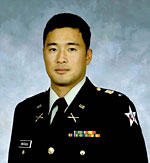 by Flemming Funch by Flemming Funch
Lt. Ehren Watada is an American army officer who has refused to be deployed to Iraq based on the war being illegal. Which he's right about, of course. But he's now being court-martialed. Does he have a chance? Probably, as his case is very well founded, and he's a patriotic model soldier, who speaks well for himself, and he has a lot of support. You're not likely to see much of it in mainstream media, but that can easily change. The Nation: On July 5 the US Army brought charges against First Lieut. Ehren Watada, an infantry officer stationed at Fort Lewis, Washington, who has refused to deploy to Iraq with his unit because he believes the war there is illegal. Watada faces up to eight years in jail and a dishonorable discharge. But in trying the 28-year-old officer, the Army is really putting itself, the Iraq War and the Bush Administration on trial.
At the June 7 press conference announcing his decision, Watada argued that the Administration's invasion and occupation of Iraq was "manifestly illegal" because it "violates our democratic system of checks and balances. It usurps international treaties and conventions that by virtue of the Constitution become American law." Watada also said, "As the order to take part in an illegal act is ultimately unlawful as well, I must as an officer of honor and integrity refuse that order."
His refusal to deploy was an act of courage. It was also the product of profound reflection on taking personal responsibility for halting the US government's careening course toward authoritarianism and criminality--and of the legal justification for such acts of responsibility. Or, see this article, with a video statement from Watada. Or a site with a lot more suporting material.
Being legally and morally right is not enough, unfortunately, as there are powerful forces opposed to letting him get away with it. But, luckily, the U.S. Supreme Court isn't entirely corrupt: Watada's most crucial legal claims were corroborated June 29 by the US Supreme Court, in what Duke University law professor Walter Dellinger calls "the most important decision on presidential power ever."
In Hamdan v. Rumsfeld, the Court rebuked the Bush Administration not only for the Guantánamo tribunals but also for the entire view of executive power the Administration used to justify them. In a 5-to-3 decision, the Court ruled that the President cannot act contrary to "limitations that Congress has, in proper exercise of its own war powers, placed on his powers." That's just what Watada said about Bush's policy two weeks before: "It violates the Constitution and the War Powers Act that limits the President in his role as Commander in Chief from using the armed forces in any way he sees fit."
The ruling also supports Watada's claim that the Administration is breaking international law. It found the President's conduct illegal because it violated international treaties--specifically, the Common Article 3 of the Geneva Conventions. This has ramifications far beyond Guantánamo: It means the government must obey the provisions of the Geneva Conventions--such as the ban on cruel and degrading treatment and the obligation of an occupying power to protect civilians. And it solidifies the incorporation of other treaties--notably, the UN Charter, with its ban on military aggression--into US law. (For a more extended discussion of the implications of the Hamdan decision for the Watada case, see our essay, Hamdan and Watada, on WarCrimesWatch.com.) But the Supreme Court doesn't have its own police force. So, like in other cases where it is the government that is the criminal, it will be the concerted actions of the public that is likely to determine the outcome.
|
|
 by Flemming Funch
by Flemming Funch